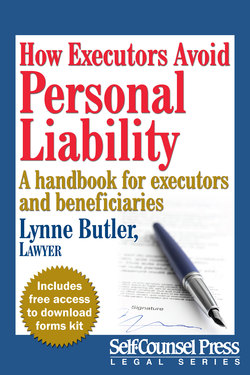How Executors Avoid Personal Liability

Реклама. ООО «ЛитРес», ИНН: 7719571260.
Оглавление
Lynne Butler. How Executors Avoid Personal Liability
How Executors Avoid Personal Liability. A handbook for executors and beneficiaries
Introduction
Chapter 1. General Laws and Rules for Executors
1. Where Does It Say That?
2. An Executor Is a Type of Trustee
3. An Executor Is a Fiduciary
4. Common Law
5. Summary of the Executor’s Responsibilities
6. Specific Language in a Will
7. The Executor’s Powers Provided by the Will
Chapter 2. An Executor Must Follow the Will
1. Making the Will “More Fair”
2. Giving Personal Items to Those Not Entitled to Them
3. Not Following Trust Instructions
4. Ignoring Parts of the Will
5. Acting while the Testator Is Still Alive
Chapter 3. An Executor Must Obtain Valuations
1. Selling Major Assets below Market Value
2. Selling Household Items
3. Acceptable Methods of Sale
4. Calling on Experts
5. Selling to Beneficiaries and to the Executor
Chapter 4. The Executor Must Communicate with Beneficiaries
1. Showing the Deceased’s Will to Family Members
2. Proactive Communication
Chapter 5. The Executor Must Not Mismanage Estate Assets
1. Mingling Estate and Personal Funds
2. The Executor’s Estate Bank Account
3. Investing Excess Cash (or Not)
3.1 Investing foolishly
4. Not Protecting Assets
5. Paying the Wrong Creditors
Chapter 6. The Executor Should Get Professional Help with the Estate
1. Be Reasonable
2. Asking the Court for Help
3. Wording in the Will
4. Matters in Dispute
Chapter 7. The Executor Must Keep Proper Records
1. Original Paperwork
2. Pay Bills and Taxes before Paying Beneficiaries and Yourself
3. Setting up a Ledger
Sample 1: Executor’s Ledger (Blank)
Sample 2: Executor’s Ledger (Filled-In)
Chapter 8. The Executor Must Know the Law
1. Loans, Gifts, and Advances Made by the Parents
2. The Limitation Period for Dependent Relief Claims
3. Intergenerational Joint Assets
Chapter 9. The Executor Must Remain Neutral between Beneficiaries
1. The Even-Hand Rule
2. Favouritism, or the Appearance of It
Chapter 10. The Executor Must Finish the Estate in Reasonable Time
1. The Executor’s Year
2. The Court’s Position
3. Interim Distribution
Sample 3: Statement of Proposed Distribution
Chapter 11. The Executor Must Handle Lawsuits Properly
1. Not Prosecuting a Third Party in Time
1.1 Unreasonable prosecution on behalf of the estate
2. Improper Settlements
Chapter 12. The Executor Must Provide a Proper Accounting
1. Statement of Receipts and Disbursements
Sample 4: Statement of Receipts and Disbursements
2. Statement of Proposed Executor’s Compensation
Sample 5: Statement of Proposed Executor’s Compensation
3. Statement of Proposed Distribution
Sample 6: Statement of Proposed Distribution
4. How to Calculate Your Compensation
5. Which Expenses You May Claim
6. How and When to Pay Yourself
Chapter 13. What Factors Are Considered by the Courts When Reviewing Cases
1. Size and Impact of the Error
2. Personal Benefit by the Executor
3. Good Faith
4. Overall Conduct
5. The Beneficiaries’ Petition
6. Beneficiary Acquiescence
Chapter 14. Possible Consequences for an Executor Who Makes a Mistake on an Estate
1. Court-Imposed Deadlines
2. Requirement to Account to Beneficiaries
3. Requirement to Pass Accounts
4. Reduction of the Executor’s Compensation
5. Removal of the Executor
6. Requirement to Repay the Estate Personally
6.1 Order of costs/legal fees
7. Contempt of Court
8. Criminal Charges
Chapter 15. Issues Specific to Estate Administrators
1. Funeral, Burial, or Cremation Arrangements
2. Preparing an Inventory
3. Applying for the CPP Death Benefit
4. Advertising for Creditors
5. Listing the House for Sale
6. Intestacy
Chapter 16. Co-executor Liability
1. Renunciation
2. Legal Protection
Chapter 17. More Ways to Protect Yourself
1. Direct the Deceased’s Mail to Your Address
2. Advertise for Creditors and Claimants
3. Executor’s Insurance
4. Hire a Trust Company As Agent
5. Get a Tax Clearance Certificate
Sample 7: Asking for a Tax Clearance Certificate (Forms TX19)
Download Kit
Dedication
About the Author
Notice to Readers
Self-Counsel Press thanks you for purchasing this ebook
Contents
Отрывок из книги
You are an executor. Most of us who act as an executor do so only once in our lives, and for most, once is plenty. The person who named you as his or her executor probably intended it to be an honour for you, but it may not always feel that way once you start the actual work. It can be a tough job. There are stacks of unfamiliar paperwork, and endless discussions with lawyers, accountants, land title clerks, and bankers. There are countless questions from family members, not all of which you know how to answer. There are laws to learn and new procedures to follow.
The majority of executors are completely unprepared for the job in the sense that there is no official training for it and they have to feel their way along as they go. Who could blame you for wondering what you have gotten yourself into?
.....
Provincially, only Québec does not use the common-law system; it has its own legal system known as a civil-law system.
An example of a common-law rule that affects executors is the concept of the executor’s year. This concept means that unless there are difficulties or complexities in an estate, the executor should be able to finalize it and pay out the beneficiaries within a year. It sets a goal for the executors, and it also alerts the beneficiaries not to expect the job to be done overnight.
.....